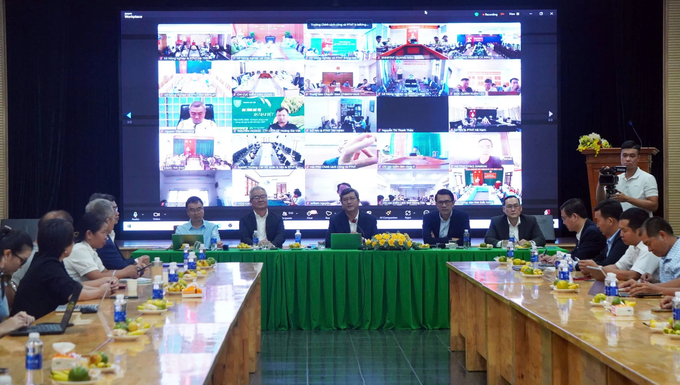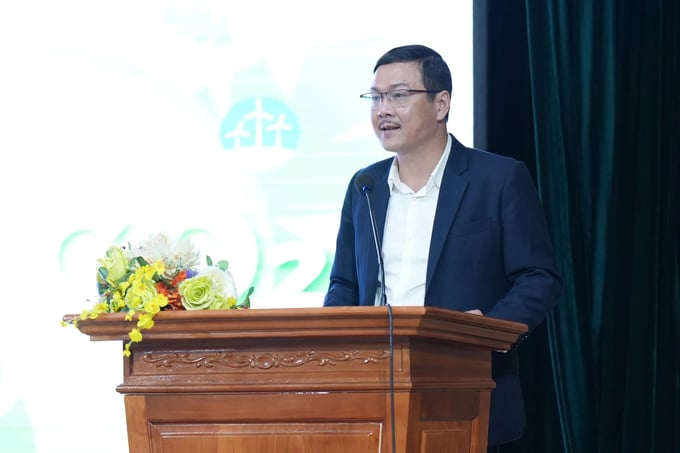May 20, 2025 | 17:14 GMT +7
May 20, 2025 | 17:14 GMT +7
Hotline: 0913.378.918
May 20, 2025 | 17:14 GMT +7
Hotline: 0913.378.918

The conference hall of the Institute for Public Policy and Rural Development in Ho Chi Minh City hosted 100 delegates for this vital discussion. Photo: Nguyen Thuy.
Editor-in-Chief of Vietnam Agriculture Newspaper, Nguyen Ngoc Thach, remarked that the high level of participation across hundreds of locations reflects significant interest in the emerging and complex subject of carbon credits.
Through expert presentations and dynamic discussions, the Editor-in-Chief hopes that every seminar participant gains a comprehensive understanding of carbon credits and the associated human resources needed for the carbon credit market. This knowledge is essential for fostering sustainable development in Vietnam amidst global climate change challenges.
As an active member of the international community, Vietnam is committed to achieving net-zero emissions by 2050, including ending deforestation by 2030 and phasing out coal-fired power generation by 2040. Realizing the Net Zero 2050 strategy requires collective responsibility from all Vietnamese citizens.
The Vietnamese Government has outlined specific strategies to honor its international commitments. Decree 06/2022/ND-CP represents a crucial step in managing CO₂ emissions and establishing a carbon market in Vietnam, furthering the nation’s dedication to environmental protection and climate change mitigation.
Recently, the Prime Minister issued Directive No. 13/CT-TTg on strengthening carbon credit management to support the implementation of Vietnam's Nationally Determined Contribution (NDC). To execute this directive, the Ministry of Agriculture and Rural Development is urgently rolling out a program to assess the potential for emissions reduction and carbon sequestration in forests at the national, regional, and local levels by 2030, with a long-term vision for 2050. Based on these assessments, the Ministry will propose annual emissions reduction quotas for forests to be allocated to ecological regions and localities by 2030.

Editor-in-Chief Nguyen Ngoc Thach highlighted six key areas necessary to achieve green growth and sustainable development. Photo: Nguyen Thuy.
To accomplish these critical tasks, Editor-in-Chief Nguyen Ngoc Thach outlined six main issues that need to be addressed in a synchronized manner to promote green growth and sustainable development:
Firstly, it is necessary to establish and perfect a clear and comprehensive legal framework for the carbon credit market in Vietnam to develop sustainably.
Second, training human resources for low-carbon emissions is an urgent and strategic task. This requires strong and synchronous attention and participation from all levels and sectors. Only when we have a professional workforce for the carbon credit market can we create a green economy for Vietnam.
Third, it is necessary to establish and organize a pilot operation of a carbon credit trading floor.
Fourth, it is necessary to have a leading business team in the field of carbon credits.
Fifth, enhancing public understanding of carbon credits, the carbon credit market, and the legal frameworks governing this new field is critical. Effective communication will educate farmers and align with the Strategy for Sustainable Agricultural and Rural Development for the period 2021 - 2030, with a vision to 2050.
Sixth, it is necessary to change the thinking of agricultural production to adapt to the changing trends of the world according to the motto "open thinking, quick results, real action."
“Carbon credits and the carbon credit market are relatively new concepts, so today’s discussion is intentionally open-ended,” remarked Editor-in-Chief Nguyen Ngoc Thach, expressing confidence that such dialogues will help pave the way for a green economy in Vietnam.
The seminar on carbon credits covered several significant topics, including the EU's Carbon Border Adjustment Mechanism (EU-CBAM), the operational mechanisms of the carbon credit market, and greenhouse gas emissions within the rice value chain, among others. Additionally, the training and education of human resources for these initiatives were emphasized as vital by many stakeholders.
At the workshop, Dr. Vo Xuan Vinh, Director of the Institute of Business Research, asserted that communication and human resource development also play a crucial role. Adopting the perspective that "for green development, people must be at the center," green growth focuses on people, helping to reduce their vulnerability to climate change; encourages individual responsibility towards the community and society; guides future generations on green living culture; and fosters a civilized, modern society that harmonizes with nature and the environment.
To transform and participate in the carbon market, the involvement of the entire political system, the people, the business community, and relevant agencies and organizations is needed. This requires implementing strategies that span diplomacy, climate action, and technology.
Translated by Quynh Chi

(VAN) In 2024, over 295 million people across 53 countries and territories faced acute hunger—an increase of almost 14 million people compared to 2023, while the number of people facing catastrophic levels of hunger reached a record high.

(VAN) World Environment Day 2025 (June 5) carries the theme 'Beat Plastic Pollution' continuing to emphasize the global urgency of addressing the plastic waste crisis.

(VAN) This was the assessment shared by experts at the workshop titled 'Assessing the Role and Potential of Low-Emission Rice Production Systems in Vietnam,' held on the morning of May 19.

(VAN) Cai Rong Port is the fisheries control center of Quang Ninh, helping to monitor fishing vessels, combat IUU fishing, and remove the EC's 'yellow card'.

(VAN) The German Agricultural Society (DLG) explores the possibility of establishing a mechanization service center in Vietnam’s Mekong Delta to support farmers in accessing and utilizing advanced machinery.

(VAN) On May 16, the Department of Water Resources Management, in collaboration with the Food and Agriculture Organization of the United Nations (FAO), held a signing ceremony for the GEF-8 project document.

(VAN) Food safety, mechanization, vocational training, and market opening are key areas of cooperation expected between the Vietnamese Government and the Federal Republic of Germany.